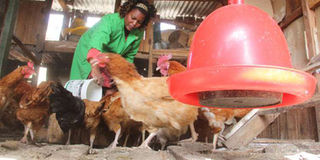Diary of a poultry farmer: Key lessons on running a poultry farm

Leah Muthoni, a poultry farmer in Nyeri, tends to her chicken. Success in chicken rearing will come only through experience, networking with the right people, learning from mistakes, persistence and perseverance. PHOTO | JOSEPH KANYI | NATION MEDIA GROUP
What you need to know:
- I was prepared for all this because I had learnt in the early stages of my venture that risks and expenses are high in poultry business.
- I have friends with great business ideas who haven’t actualised them for the simple reason that they are already employed and can’t quit.
- I remember reading somewhere that, “It is important to learn from our mistakes, but if you learn from one mistake twice, you haven’t learnt anything."
- I believe that success will come only through experience, networking with the right people, learning from mistakes, persistence and perseverance.
I have been reflecting for quite some time now if it is possible to build a successful agribusiness while still keeping my 8am-5pm job.
Hamza, a regular reader of this diary disagrees. “I think having a salaried job while keeping poultry is a sure recipe for failure. One needs to dedicate 100 per cent of their time to the venture,” he intimated.
I took his insights seriously because I am a farmer who does not give 100 per cent of my time to agribusiness.
Now, a few weeks ago, I shared the report card of my run-in with poultry and it wasn’t pleasant. I recounted my incessant calls to vets, unreliable marketing channels, stubborn diseases, unpredictable egg production and naughty workers.
I was prepared for all this because I had learnt in the early stages of my venture that risks and expenses are high in poultry business.
For example, before I started formulating my own feeds, commercial feeds accounted for 70 per cent of the cost of producing an egg or meat, meaning, I was literally working to profit the feed manufacturers.
The bottom line is that if you want to get into poultry farming, expect many disappointments, however ‘right’ you do things. More importantly, there is no quick money to make in poultry.
Hamza insisted. “In a double arrangement, one venture is doomed to fail. If you want to make it in poultry farming and reap big, you must be in it 24 hours, no more, no less.”
His insistence got me thinking: “Does one have to depend on something for a livelihood to succeed? Is ‘giving-it-your–all’ a management principle?”
LEARN FROM MISTAKES
Truth be told. I have always been fascinated with the idea of earning money without answering to a boss, reporting to an office daily or waiting for 30 days to see a pay cheque.
I also like challenges and being outdoors. Not forgetting that I grew up in the rural areas and ‘dirt flows in my blood’.
Now, after doing ample research and talking to experts and other farmers, I have figured that quitting my job to start rearing chicken full-time is like asking a hungry lion for a peck on the cheek.
In fact, I have friends with great business ideas who haven’t actualised them for the simple reason that they are already employed and can’t quit.
(Read also: Diary of a Poultry farmer: Why do I keep poultry? Well, here is my million-dollar response)
I have some lessons that I want to share with many upcoming poultry farmers. Being there for your business 24-7 doesn’t harm but success will also depend on other factors like capital for fixed and running costs and a sound management and marketing plan.
In addition to technical knowledge, be prepared to make mistakes because learning (practical knowledge) will only come from doing.
I think what we read in books or learn from seminars is just as important as how we react to events.
I remember reading somewhere that, “It is important to learn from our mistakes, but if you learn from one mistake twice, you haven’t learnt anything.” For a fact, it was Albert Einstein who best exemplified this principle when he said, “Insanity is doing the same thing again and again in the same manner and expecting different results.”
SUCCESS THROUGH EXPERIENCE
To succeed, being there all-through may not matter. You will need adequate capital to invest in proper housing, pay workers, buy feeds but even after doing all that, buyers will not necessarily come knocking at your doorsteps.
You will also need to acquire knowledge on rearing poultry, dealing with diseases and workers but reading about poultry diseases in books will not always help because when they strike, they won’t necessarily follow the written script and symptoms will even confuse the best-trained professionals.
Sometimes, the medicines prescribed won’t work.
For now, I believe that success will come only through experience, networking with the right people, learning from mistakes, persistence and perseverance.
All said, have a daily scheduled evening calls if poultry is your side hustle, take notes, use a check list to go over tasks requiring updates.
Proper records on egg production, vaccination, illness and deaths, feeding schedule and quantities, scheduled tasks (change of saw dust and head counts) come in handy.
Most importantly, hire a part-time, trusted manager and visit the farm at least once a week. Remember, always trust what you are told but verify.





